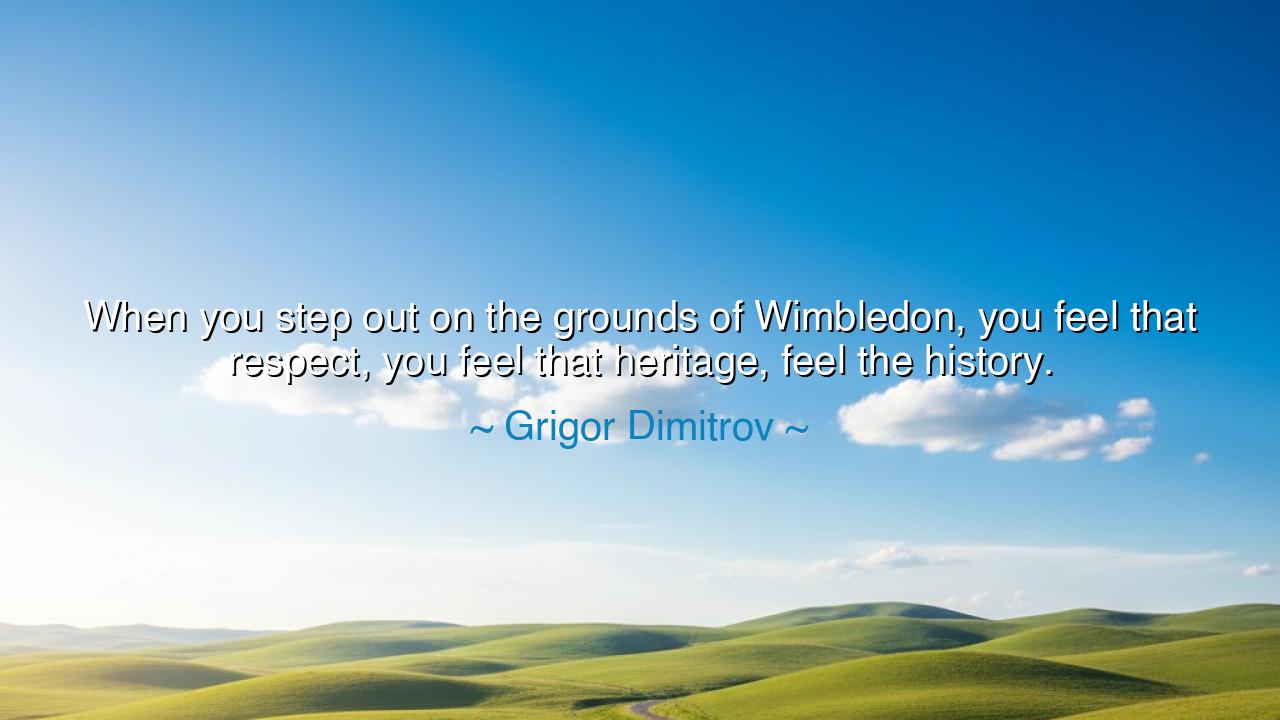
When you step out on the grounds of Wimbledon, you feel that
When you step out on the grounds of Wimbledon, you feel that respect, you feel that heritage, feel the history.






Hear the words of Grigor Dimitrov, who spoke with reverence of a place that transcends mere sport: “When you step out on the grounds of Wimbledon, you feel that respect, you feel that heritage, feel the history.” These words are not simply about tennis, nor about the grass courts where champions contend. They are about the weight of tradition, the invisible presence of generations past, and the sacredness of a place where human effort and timeless ritual are bound together.
The meaning of this quote is that some places hold more than stone, grass, or paint—they hold spirit. At Wimbledon, the white clothing, the silence before the serve, the very blades of grass carry the echoes of battles fought long ago. To step upon those grounds is to walk among the memories of the great: Borg and McEnroe, Navratilova and Serena, Federer and Nadal. The atmosphere demands not arrogance but respect, for it reminds each player that they are part of something older and greater than themselves.
The origin of this awe lies in the history of Wimbledon itself, the oldest tennis tournament in the world, born in 1877. Unlike many contests that change with fashion, Wimbledon clings to its traditions—the green lawns, the strawberries and cream, the royal box. Dimitrov’s words reveal that these customs are not relics, but living symbols, binding present champions to the lineage of those who came before. To play there is not merely to compete—it is to carry forward a legacy.
History offers us countless parallels. Think of the Roman Colosseum: though filled with violence, those who entered its arena felt the weight of empire upon them. Or the Olympic Games of ancient Greece, where athletes entered sacred grounds knowing they stood in a continuum of glory stretching back centuries. In each case, the place itself magnified the contest, demanding reverence. So too at Wimbledon, the very air seems to remind the competitor: this is not just your moment, but the world’s inheritance.
Dimitrov’s reflection also reveals a profound truth about human nature: we long for connection with the past. We wish not only to win but to belong to a story larger than ourselves. To stand where legends have stood, to feel that heritage—this inspires greater effort, greater humility, and greater joy. It is not victory alone that ennobles, but the awareness that one’s struggle is woven into a tapestry that stretches across time.
The lesson is clear: in your own life, seek out the places, the traditions, and the memories that command respect. Do not dismiss rituals as empty, for they anchor the soul. When you walk into a home, a hall, a church, or even the workplace where others have labored and sacrificed before you, pause to honor what has been built. For in honoring the past, you give depth to your present, and you prepare a foundation for those who will follow.
And so, let your actions follow. When you step into spaces of history—whether great or small—carry yourself with reverence. Acknowledge the effort of those before you. Understand that you, too, are writing upon the same page. Whether on grass courts or in the humble fields of daily life, let your spirit be one of gratitude and humility.
Thus remember Dimitrov’s words: “You feel that respect, you feel that heritage, feel the history.” For heritage is not a burden, but a gift; history is not a shadow, but a light. To honor them is to remind yourself that you are not alone, but part of a greater story—one that will endure long after your moment in the sun has passed.






AAdministratorAdministrator
Welcome, honored guests. Please leave a comment, we will respond soon